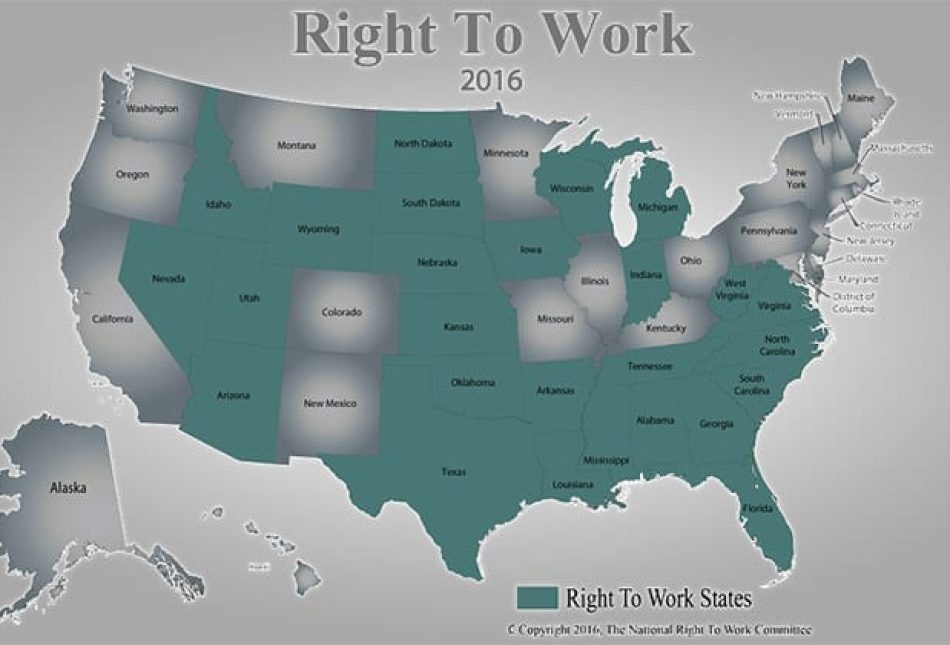NM Could Gain Jobs With a Right to Work Law


New Mexico doesn’t have a jobs problem. It has a jobs crisis.
Nationally, unemployment is falling, but in the Land of Enchantment, it’s rising. Only West Virginia has a higher jobless rate.
Even worse, labor participation for prime-age workers in our state has collapsed. The Pew Research Center recently found that between 2007 and 2015, New Mexico’s employment-to-population ratio for 25-to-54-year-olds plunged by the sharpest rate in the nation.
There are many tools state policymakers can use to restore vibrant job growth, but perhaps no reform offers more promise than passage of a right-to-work law. By ending the compulsory payment of dues to union bosses, New Mexico would send a clear signal that it’s open for business.
Says who? Site-selection experts. They consistently report a significant portion of their clients prefer RTW states.
New research confirms the value of RTW in creating jobs. The Rio Grande Foundation examined investment announcements posted on the website of Area Development, “the leading executive magazine covering corporate site selection and relocation,” between January 1st and June 30th of this year.
During the period, companies declared that they would add 92,923 positions in expansions, relocations and greenfield investments. RTW states were slated to receive 79 percent of employment – a sum, not surprisingly, far in excess of the 47 percent of private-sector jobs found in RTW states.
It’s true that “correlation is not causation,” and other factors – e.g., transportation infrastructure, workforce quality, energy costs, taxes – influence site-selection decisions. That’s why our analysis looks at RTW in several unique ways.
At the broadest level, it examines “quality” jobs – middle- and high-compensation positions in manufacturing, IT, logistics, research and development, finance, and engineering. (No positions in fast food, convenience stores, landscaping, and retail sales are included.)
A further refinement is made for projects that involve “border crossings” – i.e., when a business headquartered in a non-RTW makes an investment in a RTW state, and vice versa.
Relocations, in which enterprises move entire facilities from one type of state to another, are assessed as well.
Finally, foreign direct investment (FDI) is scrutinized, in order to determine which type of states draws the most jobs from firms based abroad.
In total, 113 border-crossing investments were announced. Ninety-six – 85 percent – shifted from non-RTW to RTW. Job-creation followed suit.
In each of the six months examined, more positions were to be created in RTW states by non-RTW-based firms than vice versa. Fourteen facilities announced journeys from non-RTW to RTW, while just three planned to go the other way.
RTW states garnered 98 percent of relocation-related jobs.
In total, 132 FDI announcements were listed. Seventy-three percent were made in RTW states, which garnered 83 percent of jobs. Of the 12 nations that announced more than one FDI in the period, ten indicated a preference for RTW states.
It’s notable that high-population, non-RTW states such as California, New York, Illinois, Pennsylvania, New Jersey, Washington, and Massachusetts did not rank among top job-creators. Also interesting were stellar performances by two Rust Belt states: Indiana (which became RTW in 2012) and Michigan (which became RTW in 2013). Of the 10 states to receive the most employment, nine were RTW.
The reality of jobs growing faster in RTW states has been established for decades. But the foundation’s research shows that banning compulsory unionism does not foster a “race to the bottom.” To the contrary, worker freedom is correlated with employment in well-compensated industries.
Furthermore, firms based in non-RTW states appear to favor expansion in and relocation to RTW states. And RTW states substantially outperform their non-RTW competitors in FDI.
It is not a panacea, but a New Mexico right-to-work law would make the Land of Enchantment more attractive to companies looking to find sites for new facilities and/or relocate existing assets. Shifting New Mexico into the RTW camp is a sound, and cost-free, policy investment to address our state’s jobs crisis.
With the 2016 legislative session around the corner, it’s time for the New Mexico Senate to finally vote on right to work.
D. Dowd Muska (dmuska@riograndefoundation.org) is research director of New Mexico’s Rio Grande Foundation, an independent, nonpartisan, tax-exempt research and educational organization dedicated to promoting prosperity for New Mexico based on principles of limited government, economic freedom and individual responsibility.
